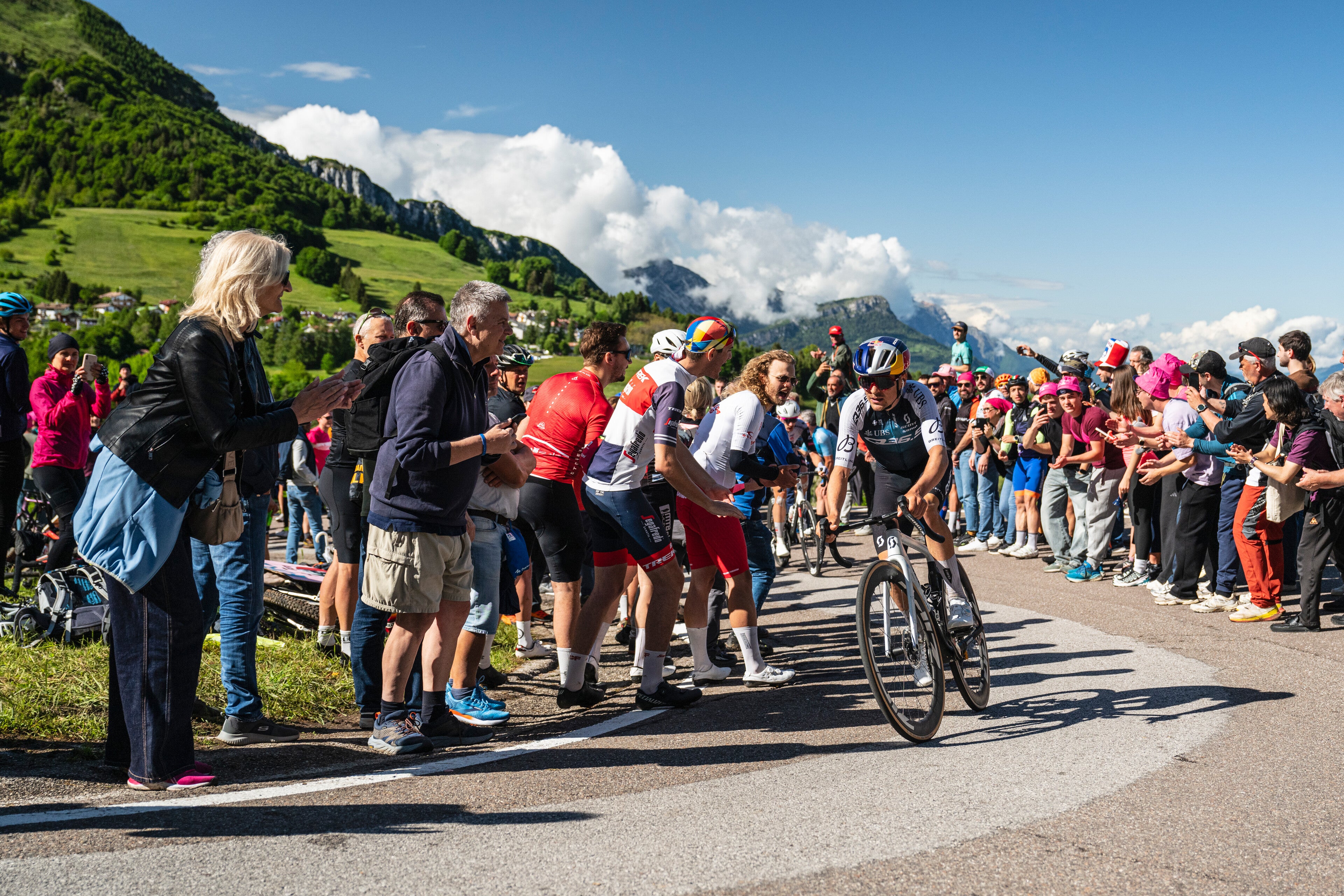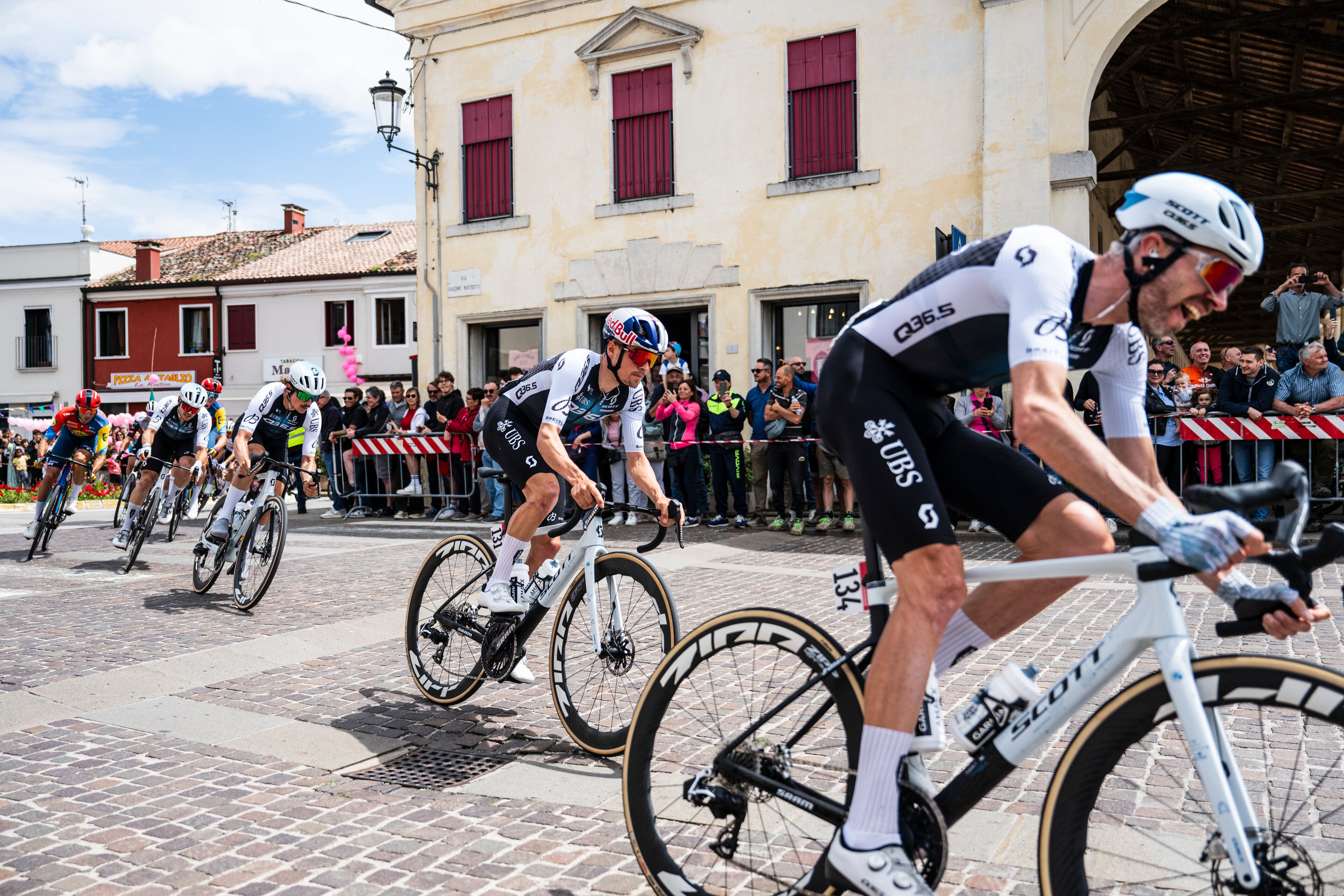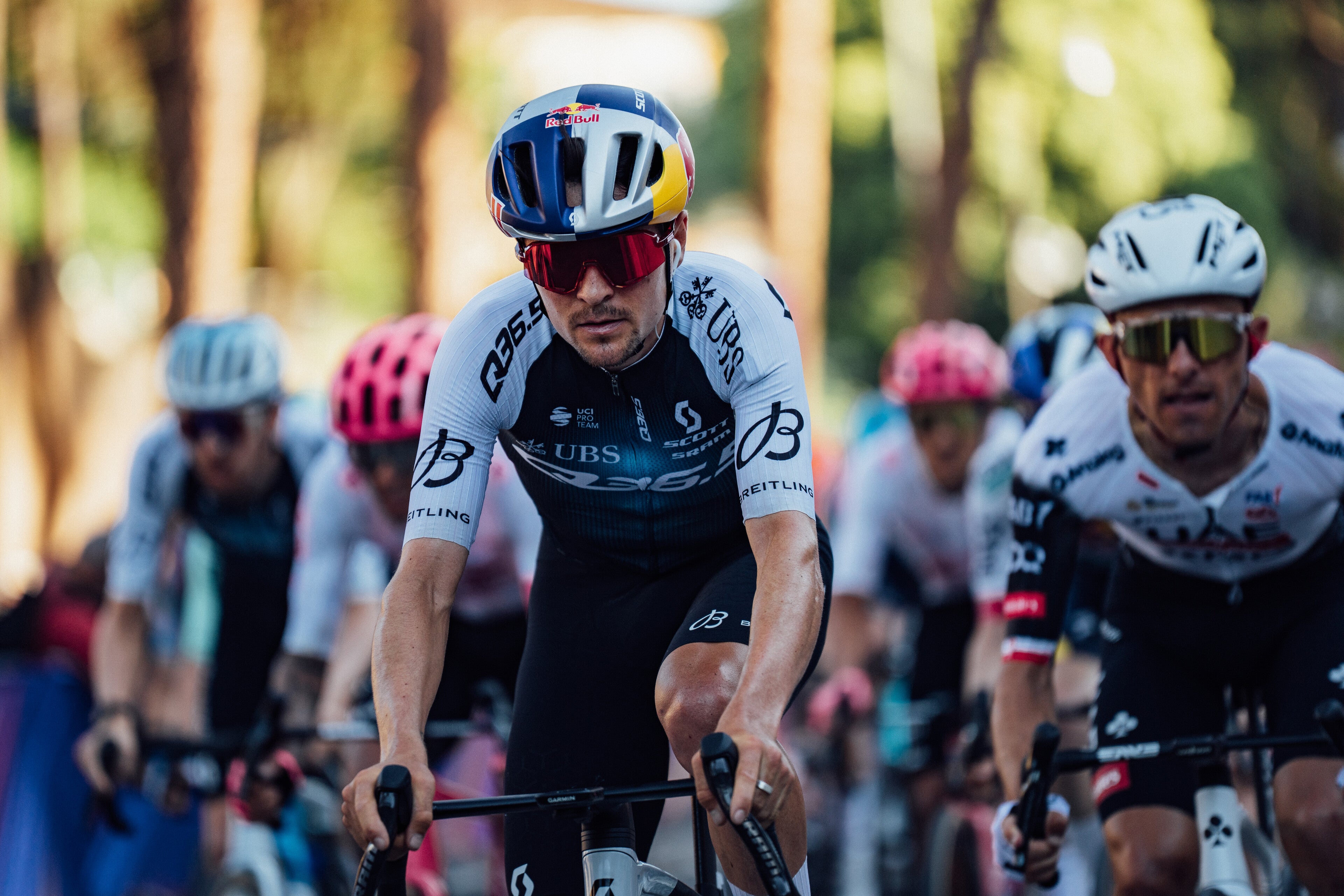Tom Pidcock’s first Giro d’Italia has been a “challenging” one. Sitting in a hotel on the outskirts of Rome, only a few hours before the race’s final stage, the Q36.5 rider is visibly tired, but says there are plenty of positives to take from the team’s first grand tour.
“We came in pretty ambitious, and we got a bit of a reality check, I think,” he admits. “We came here knowing that it was going to be challenging, but also, we wanted to come out better. We didn’t achieve that stage win or that top 10 on GC [general classification], but I think for a first attempt, it’s not the end of the world. It’s definitely the best grand tour I’ve ever ridden in terms of how I feel on the last day.”
Pidcock’s experience of grand tours in general has been mixed, from the high of his dazzling win on Alpe d’Huez in the 2022 Tour de France, to a series of top-20 overall finishes: solid achievements but below where he wants to be.
The Red Bull athlete finished 16th overall in Rome, 44 minutes behind Simon Yates, while a stage win eluded him despite his and the team’s best efforts. Four top-10 places – including fifth on the opening stage in Albania and third on stage five – were “a bit frustrating, but then again it was not bad”. He rues a missed opportunity on stage 20, when his radio broke and he wasn’t aware the peloton had split going through a cobbled town, meaning he missed the breakaway. “I was pretty pissed off,” he admits.
Now halfway through his first season since his contentious departure from British juggernaut Ineos Grenadiers, Pidcock’s enthusiasm about Q36.5 remains undimmed. He is open about having “a new lease of life” with the team, who sit the tier below World Tour teams like Ineos and Yates’s Visma-Lease a Bike, and are dependent on wildcards for access to the biggest races.
Pidcock says this was never a source of concern, with Q36.5 racing in the classics, one-day races that suit him best. “It’s not like I need any race to enjoy racing or riding my bike,” he says. His sheer star power has massively increased the team’s profile, with the Swiss outfit awarded a wildcard to both the Giro and the Vuelta a Espana.

For both Pidcock and his team, the race was about proving themselves. “The idea was we’d race to win every day – or every day that suited me – and do the best GC I could.” They particularly targeted stage nine, a gravel stage into Siena on some of the same roads as Strade Bianche, a race he won in 2023 and came second in this year.
But stage nine was another disappointment; Pidcock punctured and was caught up in a crash along with pre-race favourite Primoz Roglic before finishing 15th. “[It] was probably my biggest chance and I had a lot of bad luck that day, but the team rode incredible and they held their own, and they can be proud of that.
“I think we gained a lot of respect in the first part of the year from the World Tour teams, in the way we ride. That’s where we need to continue building.”
Pidcock started the year brilliantly, winning two stages and the overall at his first race, the AlUla Tour in Saudi Arabia in January. Strong showings at Tirreno-Adriatico and Strade Bianche followed, but it came at a cost, he says. “I think I’ve paid the price for coming out so strong, to be honest. I was super motivated at the start of the year. Even in January camp, I was in super good shape. It’s been a long time since then, kind of missed that extra few per cent.”
Asked about his attitude at the start of the season, and whether it was important to come out swinging given the circumstances of his transfer, he chooses his words carefully. “It was,” he says eventually. “I was super motivated, focused, just to show that… that it was the right thing, and to prove myself, I guess. I had a point to prove.”

At Ineos, Pidcock was one of several potential GC contenders, alongside Thymen Arensman, Egan Bernal, Carlos Rodriguez and the veteran Geraint Thomas. He says the experience of being his new team’s sole focal point has been “amazing”. “There’s been just me, and everyone there to support me. But in the Giro the last week, where we’re just kind of hanging on, it’s difficult to still be the guy with that responsibility, because you’re not doing that well and you still have to keep everyone together. I feel pressure, but I did my best.”
His attitude towards racing for general classification is also different at Q36.5. “This year was more coming from me. In Ineos, there was always someone who was better at GC, or who was actually [committed to it] and I was there like, ‘Ah, see what you can do’. Then it’s half-hearted. When it’s that bad day and you have to dig deep, it’s like, ‘it’s OK, because we still have this [other] guy’. Whereas now it’s all on me.”
One apparent source of tension between Ineos and Pidcock – a double Olympic mountain bike champion and a former cyclocross world champion – had been his off-road ambitions, which sat uneasily with Ineos’s focus on road racing. It is ironic, then, although completely understandable, that Pidcock skipped the last cyclocross season as he settled into his new team, and the 25-year-old admitted that he won’t necessarily return to it. “I needed a proper reset, and it definitely worked well for the first part of the year,” he says. “We’ll see [about the future]. Cyclocross is tough, we race so much on the road and then to also be mentally racing through the winter as well, it’s hard.”
Asked whether juggling competing ambitions across so many different disciplines is feasible, Pidcock takes his time before answering. “I think as a young rider, yeah. But as you get older, you can’t keep on the throttle so much, I feel. You have less energy, and you have to use it more carefully.”

He will be back in action on the mountain bike this summer, at the World Cup in Andorra and the European Championships, before turning his attention to the second half of his season. “I want to end the year well with the worlds and [Il] Lombardia, and the Vuelta, we need to think about what we want to do.” He chuckles wryly at the memory of last year’s Il Lombardia, when Ineos made the surprise decision to deselect him from the team despite his obviously good form and a second place at the previous race, the Giro dell’Emilia.
The Vuelta in September represents another chance for Q36.5 and Pidcock to target the general classification over three weeks. He is non-committal about whether that will be his aim. “Here, I had a certain level which was just a bit below the top 10 GC guys. I got three weeks in my legs but I don’t want to spend energy every day for that; if I want to do GC, I really want to be in the mix and want to win stages on the super hard days, which I think I can. But I want to sit down and really chat with the team and see where the gaps are.” It’s a work in progress, but Pidcock believes it’s moving in the right direction.
Matthew Brennan: The young British talent making waves in elite cycling
The Yates lesson that Del Toro must learn from unforgettable Giro d’Italia
Simon Yates’ career comes full circle with long-awaited Giro d’Italia glory
Giro d’Italia Stage 21 preview: Map, standings and route to Rome as race finishes







